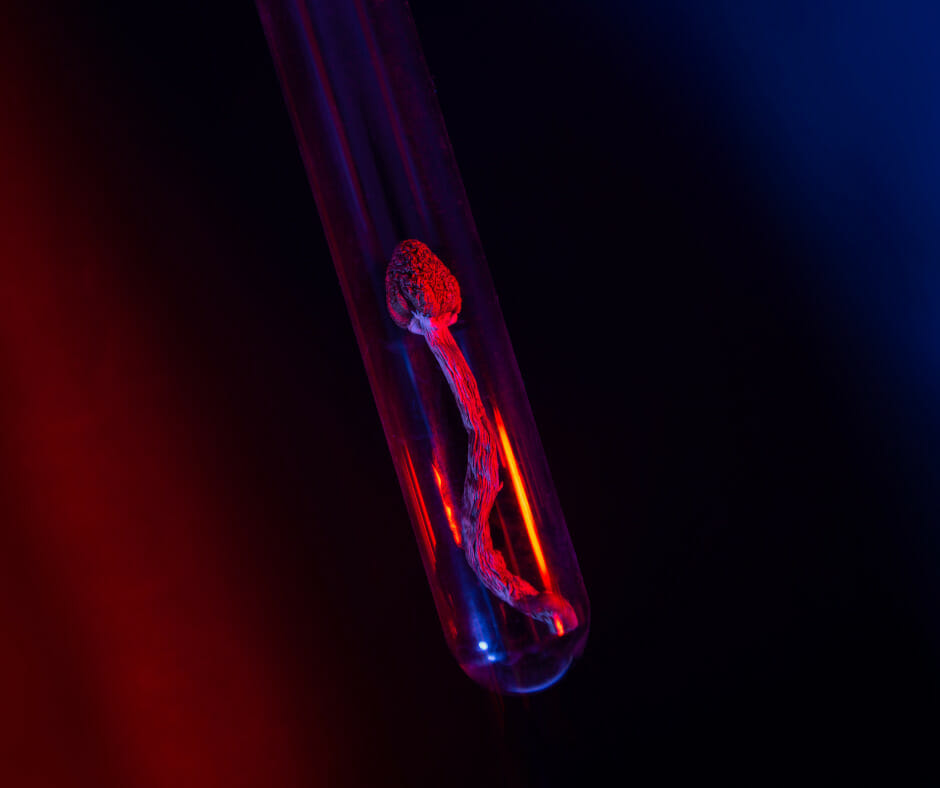Psilocybin, the active ingredient in “magic mushrooms,” has been gaining attention in recent years for its potential therapeutic benefits in treating a variety of mental health conditions. However, as with any substance, it is possible for individuals to develop an addiction to psilocybin.
This article will explore the various rehab services available for individuals seeking treatment for psilocybin addiction, including behavioral therapy, support groups, and medication-assisted treatment. Get in touch with the team at Lantana Recovery to get help with psilocybin addiction. And it’s also worth noting that while psilocybin is not considered physically addictive, it can create psychological dependence.

What is Psilocybin
Psilocybin is a naturally occurring psychedelic compound found in certain species of mushrooms. It is the main psychoactive ingredient responsible for the “magic” in “magic mushrooms.”
Psilocybin is used for its ability to produce hallucinations, changes in perception, and altered states of consciousness. It has been studied for its potential therapeutic benefits in treating a variety of mental health conditions such as depression, anxiety, and PTSD.
However, while psilocybin is not considered physically addictive, it can create psychological dependence.
Treatment Options for Psilocybin Addiction
When it comes to treating psilocybin addiction, there are several effective treatment options available. Psilocybin is a hallucinogenic substance derived from certain mushrooms, and it’s known to cause strong physical and psychological effects. Although it has a low potential for abuse and addiction, it’s important to be aware of the treatment options available.

Inpatient Rehab
Inpatient rehab is a comprehensive treatment program that helps individuals with substance abuse disorders like psilocybin addiction. Inpatient rehab is a residential program, meaning that the patient lives at the rehab facility while receiving treatment.
This type of program typically lasts for 30 days and offers 24/7 monitoring and support. Inpatient rehab for psilocybin addiction usually involves individual and group therapy, medication management, and other activities that help the patient develop better coping skills and healthier behaviors.
Partial Hospitalization Rehab
Part hospitalization rehab is a step down from inpatient rehab. It typically lasts for four to six weeks and is ideal for those who need a more intensive level of care, but don’t require full-time monitoring. Lantana Recovery rehab provides partial hospitalization programming for those struggling with psilocybin use disorder.
This level of care includes individual and group therapy, medication management, and other activities that help the patient build a foundation for long-term recovery.
Intensive Outpatient Rehab
Intensive outpatient rehab is a program for individuals who don’t require residential treatment but still need more intensive care than traditional outpatient rehab. This level of rehab care can last for several weeks to several months and involves individual and group therapy, medication management, and other activities that help the patient develop better coping skills.
Outpatient Rehab
Outpatient rehab is a less intensive program than inpatient or part-hospitalization rehab. It typically involves weekly therapy sessions, medication management, and other activities that help the patient learn healthier behaviors. Outpatient rehab can last for several weeks to several months, depending on the needs of the patient.
No matter the type of program, treatment for psilocybin addiction should be tailored to the individual’s needs in order to be most effective. While these treatment options can be effective, they all require the patient to be willing and committed to making the necessary lifestyle changes in order to achieve long-term recovery.

Psilocybin: Dependance vs. Addiction
Psilocybin dependence refers to a state in which an individual experiences withdrawal symptoms when the substance is no longer being used. It can also refer to the body’s adaptation to a substance, such that higher doses are needed to achieve the same effect.
Psilocybin addiction refers to the compulsive use of a substance despite negative consequences, as well as a loss of control over the use of the substance. It is characterized by the presence of tolerance, withdrawal, and compulsions to use the substance.
While both dependence and addiction involve a compulsive use of a substance, addiction is a more severe condition characterized by a loss of control, negative consequences, and the presence of tolerance and withdrawal. Psilocybin is not considered to be physically addictive, However, it can create a psychological dependence, which can lead to addiction if not handled properly.
Psilocybin Addiction Symptoms
Psilocybin addiction is a condition in which an individual compulsively uses the substance despite negative consequences. It can manifest in both physical and psychological symptoms. Below are some examples of physical symptoms and psychological symptoms that may indicate a psilocybin addiction.
Physical Symptoms
Physical symptoms of psilocybin addiction may include the following:
- Increased heart rate
- Elevated blood pressure
- Dilated pupils
- Nausea
- Loss of appetite
- Tremors or shaking
- Sweating
Psychological Symptoms
Psychological symptoms of psilocybin addiction may include the following:
- Intense cravings for the drug
- Difficulty concentrating
- Mood swings
- Anxiety or paranoia
- Hallucinations
- Delusions
- Impaired judgment
- Difficulty with impulse control
- Compulsive use of the drug despite negative consequences
It’s important to note that while psilocybin is not considered physically addictive, it can create psychological dependence. Therefore, psychological symptoms may be the most prominent signs of psilocybin addiction. Furthermore, long-term or high-dose use of psilocybin may lead to persistent changes in perception, cognitive function, and emotional state, known as Hallucinogen Persisting Perception Disorder (HPPD).
Diagnosing Psilocybin Addiction
Diagnosing psilocybin addiction in someone else can be challenging, as the symptoms can be subjective and may vary from person to person. It’s best to speak to professional such as staff at Lantana Recovery to help. Some steps that can be taken to diagnose psilocybin addiction include:
- Physical examination to assess for physical symptoms of psilocybin addiction, such as increased heart rate, dilated pupils, or tremors.
- Conducting interviews with the individual and their loved ones to gather information about their drug use, mental health, and any negative consequences that have occurred as a result of their drug use.
- Psychological evaluations to assess for psychological symptoms of psilocybin addiction, such as intense cravings, mood swings, or impaired judgment.
- Conducting tests such as urinalysis or blood tests to determine if the individual has been using psilocybin, and if so, in what quantity.
It’s important to note that the diagnostic process should be conducted by a qualified healthcare professional with experience in addiction treatment and that a psilocybin addiction diagnosis should be done in the context of a complete assessment of the individual’s overall mental and physical health.
Psilocybin Addiction Treatment Options in South Carolina
South Carolina has seen an increase in the use of psychedelic drugs, including psilocybin, over the past few years. As a result, many treatment centers in the state are providing a variety of treatment options for people who may be struggling with addiction or other issues related to psychedelics.
Psilocybin Rehab in Charleston
In Charleston, South Carolina, there a handful of facilities dedicated solely to helping individuals struggling with psilocybin addiction. These drug treatment facilities in Charleston such as Lantana Recovery provide comprehensive care, including individual and group therapy, as well as medication management. Normally their team of practitioners includes mental health counselors, addiction specialists, and experienced medical staff to help treat psilocybin substance use disorder.
Psychedelic Addiction Treatment for Greenville Residents
Greenville, South Carolina, is home to a number of treatment centers that provide psychedelic addiction treatment. These rehab centers in Greenville strive to provide comprehensive care tailored to the individual patient’s needs. Lantana Recovery treats different psychedelic substances and extends addiction treatment services for Greenville residents.
Patients can expect to receive individual and group therapy, and medication management. In addition, some of the centers provide access to alternative therapies such as yoga, meditation, and acupuncture.
Psilocybin Drug Treatment Services Extended to Columbia
For locals around Columbia, SC, Lantana Recovery has extended their rehab services to treat those battling with psilocybin addiction. A number of organizations are now offering addiction treatment for individuals experiencing issues related to psychedelics.
Many addiction treatment facilities serving the Columbia area provide a range of services, including individual and group therapy, psychotherapy, and medication management for psilocybin addiction.
Psilocybin Addiction: Long-Term Effects
The long-term effects of psilocybin addiction can vary depending on the individual and the length and severity of their addiction. However, potential long-term effects of psilocybin addiction may include the following:
- Persistent psychosis: Long-term use of psilocybin can lead to persistent changes in perception, cognitive function, and emotional state, known as Hallucinogen Persisting Perception Disorder (HPPD). Symptoms of HPPD can include visual disturbances such as halos, trails, or flashes of light, as well as changes in mood and cognitive function.
- Mental health issues: Psilocybin addiction can exacerbate pre-existing mental health conditions or lead to the development of new mental health issues, such as depression, anxiety, or PTSD.
- Cognitive impairment: Long-term use of psilocybin can lead to cognitive impairment, including problems with memory, attention, and decision-making.
- Social and personal problems: Psilocybin addiction can lead to social and personal problems such as job loss, financial difficulties, relationship problems, and legal issues.
- Tolerance: Long-term use of psilocybin can lead to tolerance, meaning that higher doses of the drug are needed to achieve the same effects. This can increase the risk of overdose and other negative consequences.
Individuals who have been using psilocybin for a long time and/or at high doses should be extra cautious in stopping the use as it can lead to withdrawal symptoms such as anxiety, depression, and insomnia. It’s always wise to consult a professional when dealing with psilocybin addiction.
Psilocybin Treatment FAQs:
Can you detox for Psilocybin addiction?
Yes, you can detox for psilocybin addiction. Depending on the severity, detox can be a first step in the treatment of psilocybin addiction. Detox for psilocybin is the process of allowing the body to rid itself of the drug while managing any withdrawal symptoms that may occur.
Can I attend inpatient rehab for Psilocybin addiction?
Yes, you can attend inpatient rehab for psilocybin addiction.
Can I enroll in outpatient rehab for Psilocybin addiction?
Yes, you can attend outpatient rehab for psilocybin addiction.
Can I Overdose on Psilocybin?
It is possible to overdose on psilocybin, symptoms of a psilocybin overdose can include increased heart rate, high blood pressure, agitation, confusion, paranoia, and hallucinations. In rare cases, an overdose can lead to more serious effects such as seizures or a coma.
Final Thoughts on Psilocybin Addiction Treatment:
Psilocybin addiction is a serious issue that can have a significant impact on an individual’s life. However, with the right treatment and support, individuals can overcome their addiction and regain control of their lives. Lantana Recovery can help treat psilocybin addiction!
Rehab services for psilocybin addiction typically include a combination of therapy, counseling, and support groups. These services can help individuals identify the underlying causes of their addiction, develop coping mechanisms, and learn new skills to maintain long-term recovery.
With a combination of these treatments, individuals with psilocybin addiction can recover and live healthier, happier life.





